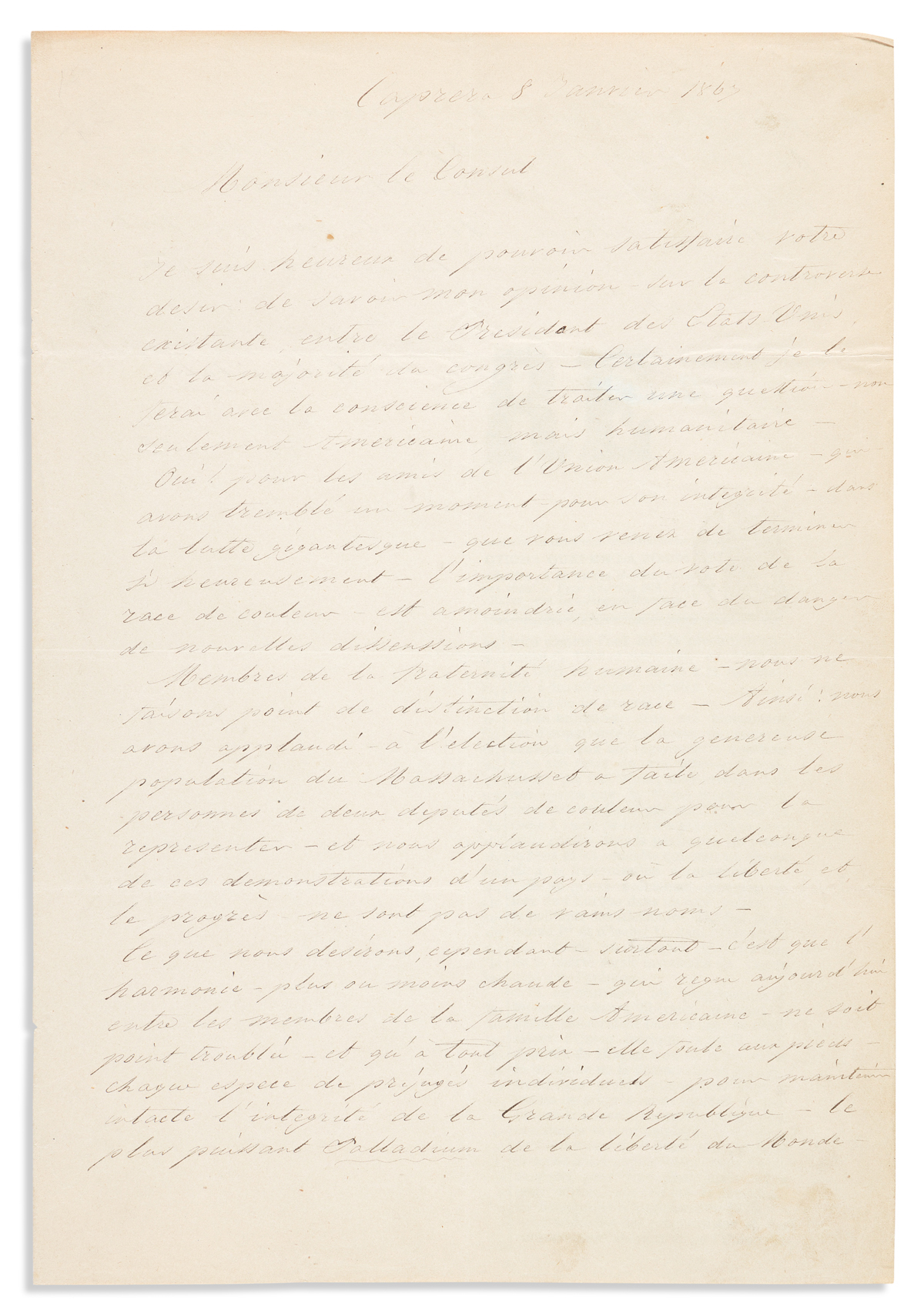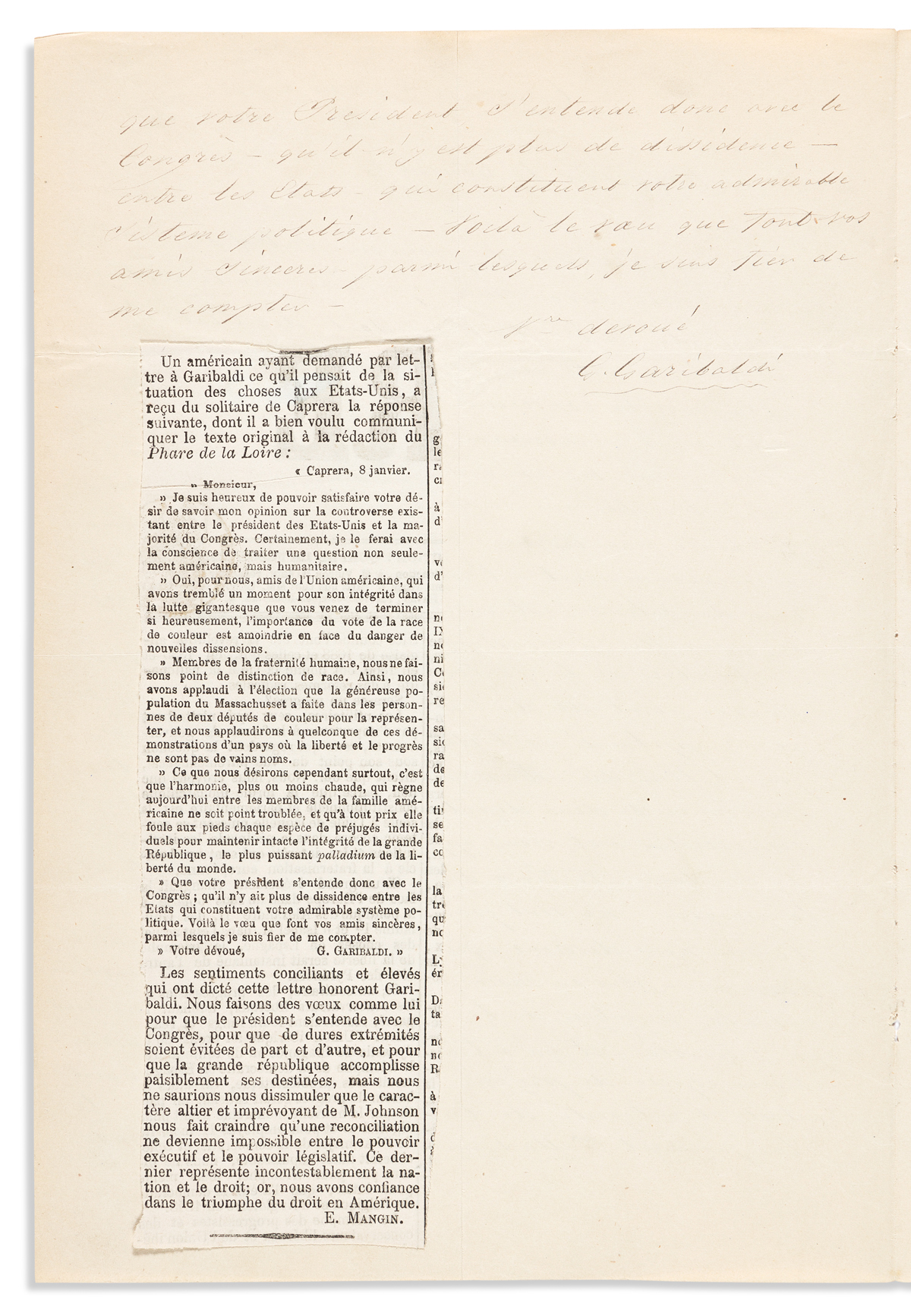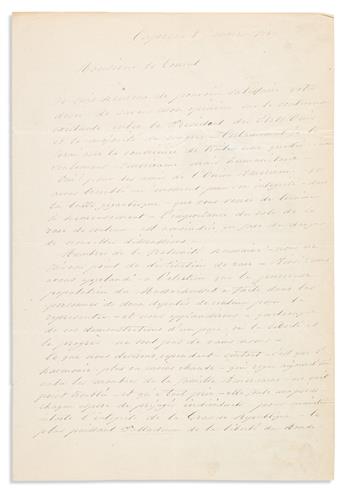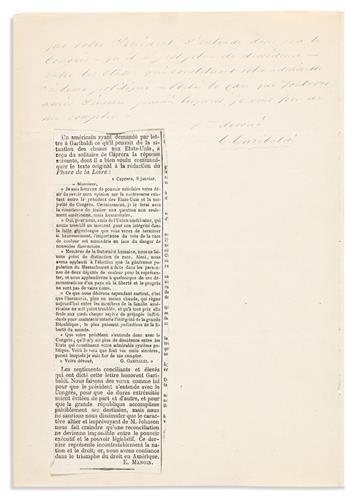Sale 2573 - Lot 51
Unsold
Estimate: $ 3,500 - $ 5,000
"AS MEMBERS OF THE HUMAN FRATERNITY, WE MAKE NO DISTINCTION OF RACE WHATSOEVER" (REVOLUTIONARIES.) GARIBALDI, GIUSEPPE. Autograph Letter Signed, "G. Garibaldi," to "Dear Mr. Consul," in French, praising the election of two African-Americans to the MA state legislature [Edward G. Walker and Charles L. Mitchell], expressing the hope that Americans would destroy any prejudices within themselves that threaten the harmony that preserves the union of states, and hoping that the president [Andrew Johnson] would reach an agreement with Congress. 1 1/4 pages, tall 4to, with integral blank; slight fading to text and signature (but very legible), faint even toning overall, newspaper clipping quoting the French text of the letter pasted to page 2 beside signature, folds. Caprera, 8 January 1867
Additional Details
"I am happy to be able to satisfy your desire to know my opinion about the controversy which exists between the President of the United States and the majority of the Congress. . . .
"Yes, for us friends of the American union who feared briefly for its unity in the gigantic struggle which you have just ended so successfully, the importance of the vote for the colored race is lessened in comparison to the danger of new dissentions.
"As members of the human fraternity, we make no distinction of race whatsoever. So we applauded the selection which the magnanimous population of Massachusetts made in the person of two colored representatives . . . and we applaud any such proofs from a country where liberty and progress are not empty words.
"However, what we desire above all is that the more or less warm harmony which today prevails . . . be not at all troubled, and that . . . [Americans] trample underfoot every kind of individual prejudice in order to maintain intact the unity of the great Republic, the most powerful symbol of liberty in the world.
"Therefore let your President reach an understanding with the Congress; let there be no more dissent between the States . . . ."
In a series of confrontations between the Republican-controlled Congress and the Democratic president Andrew Johnson that culminated in his impeachment (and acquittal) in 1868, Johnson repeatedly resisted the efforts of Reconstructionists to restore rights to the formerly enslaved, including vetoing the Freedmen's Bureau bill in February and the Civil Rights Act in April of 1866.
"Yes, for us friends of the American union who feared briefly for its unity in the gigantic struggle which you have just ended so successfully, the importance of the vote for the colored race is lessened in comparison to the danger of new dissentions.
"As members of the human fraternity, we make no distinction of race whatsoever. So we applauded the selection which the magnanimous population of Massachusetts made in the person of two colored representatives . . . and we applaud any such proofs from a country where liberty and progress are not empty words.
"However, what we desire above all is that the more or less warm harmony which today prevails . . . be not at all troubled, and that . . . [Americans] trample underfoot every kind of individual prejudice in order to maintain intact the unity of the great Republic, the most powerful symbol of liberty in the world.
"Therefore let your President reach an understanding with the Congress; let there be no more dissent between the States . . . ."
In a series of confrontations between the Republican-controlled Congress and the Democratic president Andrew Johnson that culminated in his impeachment (and acquittal) in 1868, Johnson repeatedly resisted the efforts of Reconstructionists to restore rights to the formerly enslaved, including vetoing the Freedmen's Bureau bill in February and the Civil Rights Act in April of 1866.
Exhibition Hours
Exhibition Hours
Aliquam vulputate ornare congue. Vestibulum maximus, libero in placerat faucibus, risus nisl molestie massa, ut maximus metus lectus vel lorem.






